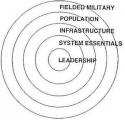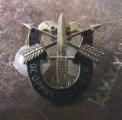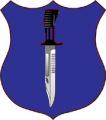102. INSURGENCY AND COUNTERINSURGENCY
a.
Insurgency Defined. - - A condition resulting from a revolt or insurrection against a constituted government which falls short of civil war. In the current context, insurgency is primarily communist inspired, supported or exploited.
b.
Counterinsurgency Defined. - - Those military, paramilitary, political, economic, psychological and civic actions taken by a government to defeat subversive insurgency.
...---...
106. EVOLUTION OF FORCES
Resistance stems from the dissatisfaction of some part of the population. The dissatisfaction may be real, imagined or incited and is usually centered around a desire for - -
(1) Political change.
(2) Relief from actual or alleged oppression.
(3) Elimination of foreign occupation or exploitation.
(4) Economic and social improvement.
(5) Religious expression.
Resistance movements may form locally or be inspired by “sponsoring powers.” The evolution of the guerrilla force usually follows a sequence of events that form a pattern:
(1) The existence of a dissident group.
(2) The emergence of groups which are willing to bear arms.
(3) The appearance of strong, determined leaders to further organize and orient these groups. As members of underground organizations are identified and resistance grows, guerrilla bands form in secure areas to become the military arm of the guerrilla force.
(4) Initial successes are exploited to convince elements of the population to support an effective guerrilla organization.
(5) Seeking and accepting support from external sources.
(6) The employment of equipment and personnel furnished by external sources
(7) The integration of the guerrilla forces into a regular military organization.
















Bookmarks